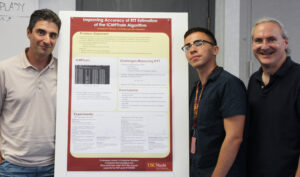We would to thank Christopher Morales Ramos for his summer internship at ANT, as part of the NSF-sponsored Research Experiences for Undergraduates (REU) Program at ISI in 2018:
Human Communication in a Connected World. Christopher interned with us as part of his studies at the University of Puerto Rico where he is an undergraduate student in computer science.

Christopher’s project was improving the accuracy in estimating Round Trip Time (RTT) measurements from icmptrain our high-speed IPv4 prober, while minimizing the amount of traffic that was sent. In addition to improving RTT estimates, his work can lead to better geolocation estimates.
His research at ISI was jointly advised by Yuri Pradkin and John Heidemann, as part of the ISI REU program directed by Jelena Mirkovic.
